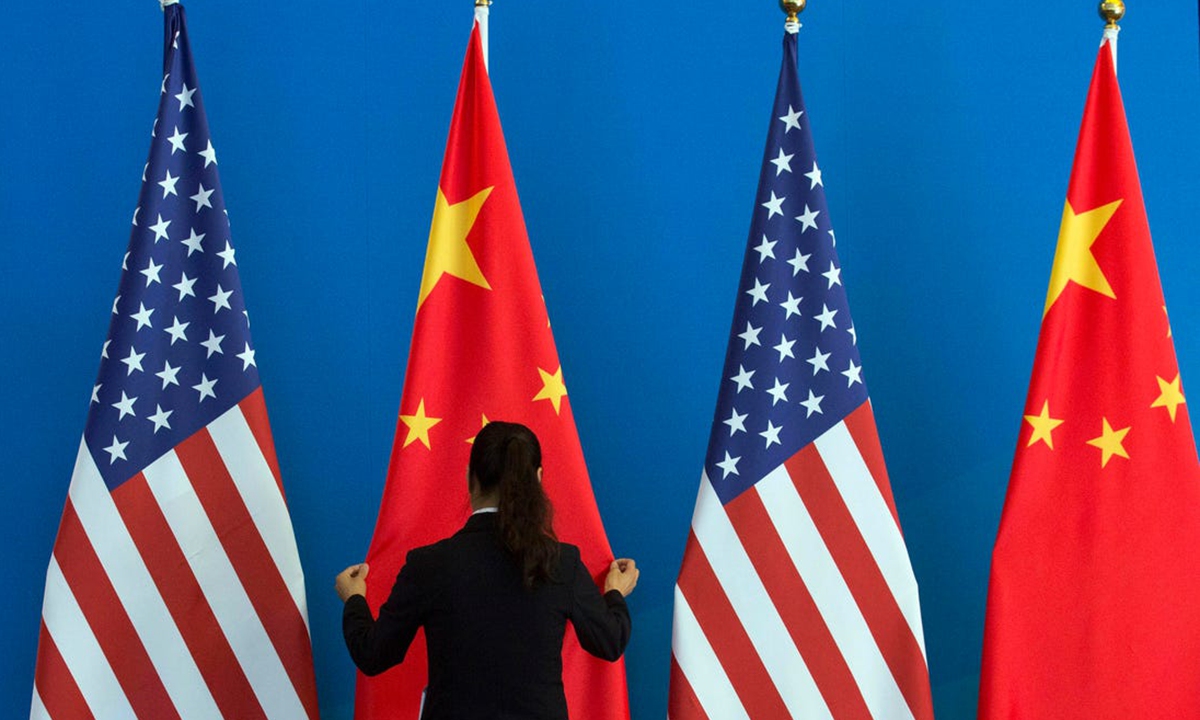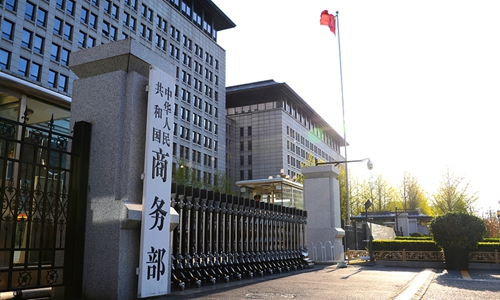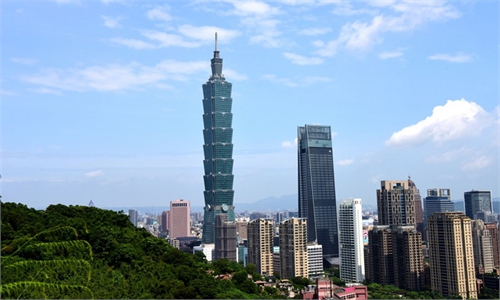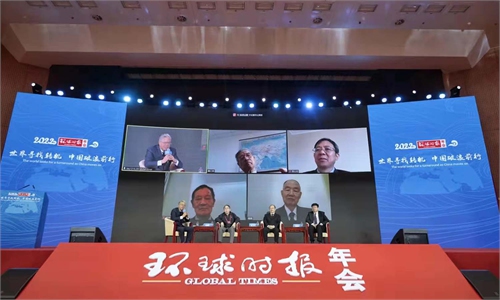Diplomatic cooperation clever option for global powers in multipolar world: historian Paul Kennedy

Photo:VCG
Editor's Note:"The US might be No.1, but its share of the whole has steadily come down over the past 80 years since the end of the Second World War," said historian Paul Kennedy (Kennedy). He believes that while China is getting closer, "the US is deeply concerned." Three decades after the publishing of renowned The Rise and Fall of the Great Powers, how does Kennedy view the current major power competition? Why should big countries be, as he said, "prudent"? The Global Times (GT) correspondent talked with him on these issues. The following are the excerpts.
GT: This year marks the 33rd anniversary since the publishing of the book The Rise and Fall of the Great Powers. It is said that you were asked by a publishing house to write a new foreword for the book. After deep reflection, you said that the main ideas in the book "do not need to change." Why are you so certain?
Kennedy: I should say in explanation to the Chinese readers of the book, that there will be an additional chapter, an additional section at the end of the book. The new revision of this will have a short, new introduction, which describes the reasons why I began to think of writing the book The Rise and Fall of the Great Powers. I hope the new revision of this book is published in 2022.
In the first case, that's the background description. The entire text of the 1980s edition will stay unchanged. But at the end of it, there will be something like a 60-page additional section of reflections on the message of the argument of the book, but also on how things have changed in the 33 years since book came out. And then some thoughts about where the world might be going in the future. However, when I said that the main ideas in the book will not be changed, what I meant was that the main argument of the book that the rise and fall of the great powers in history, which is a political and territorial story, is ultimately influenced by the relative economic strength and technical power of each of the nations in the great power system. So the rise and fall theory that nations and empires rise and fall, depending upon relative economic power, will not change.
GT: What do you think of the collapse of the Soviet Union? Is it the greatest "rise and fall of the great powers" of the last century? Do you think there is still a "cold war" atmosphere over the US, Russia and China?
Kennedy: The collapse of the Soviet Union is really the most interesting and significant of the collapses of a great power in the 20th century. Why do I say that? Because the other two great collapse events which occurred were at the end of a very testing, expensive, and ruinous war.
In 1918, after four years of great warfare, Imperial Germany and the Austro Hungarian Empire collapsed, and also Turkish rule in the Middle East collapsed. But all of these collapses were caused by the pressure of war, even the collapse of Russian Empire, leading to the founding of a Soviet Union, was driven by war.
Then if you come forward to the collapse of Mussolini Italy in 1943, clearly caused by defeat in war, and then the collapse of Nazi Germany, and Imperial Japan in the middle of 1945, all caused by strenuous war.
Why is the collapse of the Soviet Union so special? Because it did not take place in wartime. It was clearly due to the internal weaknesses of the Soviet Union as the new leader, Mikhail Gorbachev realized when he tried to rescue it and he failed. Nonetheless, their internal economic, social, and technological backwardness caused its collapse, the only big power collapse in peacetime. That's significant. At the time of the collapse of the Soviet Union, there was great expectation on many sides that the Cold War was over, the arms race could be reduced, and relations could improve between the East and the West. The Soviet control of eastern satellite states was no more. The Soviet Union collapsed into 15 small republics. And it seemed as if the Cold War was over. And in a larger sense, I still think we could say that the Cold War finished with the collapse of Soviet Union.
GT: In your recent article "The Future of American power" in the Economist, you used a metaphor - "Because even if America is the biggest gorilla in the jungle, it is only one gorilla in a group!" and asked, "Can America afford to stay ahead?" Do you really think China is about to overtake the US?
Kennedy: Is America the biggest gorilla in the group? What I mean is that the US is still by many measures, like measuring its economics, defense budget, the size of its military, still the biggest and most powerful. But there are other large concentrations of national, economic, and military power in the world today in the monkey cage.
There is a very large America and a very large and rising China. There is a significant growth in the power of India. There is a European Union, and there is Japan, so at least five concentrations of economic and technical power. The US might be No.1, but its share of the whole has steadily come down over the past 80 years since the end of the Second World War.
The US, about two decades ago, was probably three times bigger than China economically. Now, China has got closer and closer. So, it has not yet overtaken the US. And maybe China with its own economic problems and challenges, will have difficulty in overtaking the US, but it is getting close. And the US is deeply concerned about that.
The Chinese total size of GDP is now much closer to American total size. Will it continue? Every economist would warn you that a trend is a trend and then trends change. But the pattern over the past half century is China getting closer and closer to the American relative size of power.
It is true that the US is still the predominant military power and still spends the most on defense. The gap has closed, even in a military sense. The gap has closed in because of China's missile technology and the very significant expenditure by the Chinese government on its warships and naval technology. China has also advanced in artificial intelligence technology and even in the development of a surface navy, and it is reportedly building the 4th aircraft carrier. Now China has much more modern frigates and destroyers. So China already has the second largest fleet of aircraft carriers among the navies of the world, while the US aircraft carriers are getting very old, one of them not functioning. You will see the gap is closing. It doesn't mean that China is about to overtake, but it has gotten much closer.
GT: Trade frictions with China have escalated since the Trump presidency, and only recently did the Biden administration show some signs of easing. Do you have any advice on how to find a balance between the great powers? Will US ruling class and the Democratic and Republican elites listen to such kind of advice?
Kennedy: When we use the phrase unipolar moment, or when we said that the US was the single pole in a unipolar world, this was because we in the world had seen this for 40 years, cold war antagonism between two poles, Washington on the one side and Moscow on the other.
And when the Moscow side fell, it seemed there was just a single pole of power, the unipolar moment. But when historians use the word moment, they don't actually mean a very brief period of time, like three seconds or so. What happened after the US became No.1 alone was that it started to reduce its defense spending. The economy was not really growing very quickly compared with the economies in East Asia. Other countries were rising and shares of productive power were altering. And so what we had was a bipolar world for 40 years, then a unipolar world, maybe for 10 years.
And now we are steadily moving to a multipolar world. As I said before, there are maybe four or five very large economic powers. The second of those large economic powers clearly is China. Statistically speaking, China's GDP is now much larger than Japan's. It's about the same size as Europe, because Europe is very rich and has more than 20 nations together. But it grows faster than Europe. It grows faster than the US. It is still way ahead of the other big Asian country, which is India. But you will notice that behind all of this, there is no mention of the economic terms of Russia.
So what is left in this multipolar world is for each of the five powers to realize that they should be working diplomatically to maintain good relation with the other powers.
China's relationship with other parts of the globe, including the US, Japan, Australia, and possibly Europe, is much more fluctuating and much more problematic and in the midst of this, both Beijing and Washington, if they are clever, will always work to keep good relations with the other players in the multipolar world.

Paul Kennedy. Photo: Courtesy of Kennedy
GT: The two wars launched after the September 11 terrorist attacks, in Afghanistan and Iraq, are now seen as the cause of US decline. When we look back, why didn't the US avoid relative decline?Kennedy: So there are different ways of thinking about decline and defeat. When I use the word rise and fall of the great powers or decline, I am not thinking of a single war or single regional conflict. I'm thinking of the relative power of the US in the world relative to the defeated Germany and Japan back in 1945, relative to the present rise of China and Asia.
In the 21st century, the US was already losing share of world product. I think, therefore, it was rather unwise for American governments to spend so much of their military forces and energies in these two conflicts, the Iraq and Afghan wars, because it cost a lot of money, cost a lot of lives. It was not possible for the US to carry out its political intention to be dominant and to get the political concept or the political outcome it wanted in Afghanistan. It just could not manage the troops fighting on the ground in the mountains. It may not have been able to carry out its political purpose in Iraq in the midst of all of these losses of short term regional battles.
I would just like to make the point that the US can be very strong in military terms. It also could have a competitive economy and technology, but that does not mean it can win a big war 6,000 miles away in Asia. Every country which has attempted to get some control of Asia from the outside eventually falls back.
The Soviet Union tried to go into Afghanistan. It turned out to be militarily physically too difficult and it pulled back. France tried to control Hanoi and French Indochina. They could do it for a while, but it exhausted them, and they pulled back. The US tried to fight a very big war in Vietnam. At one time, it had 500,000 troops in Vietnam. It could not work. The recent war in Afghanistan went the same. It's too difficult militarily to conquer.
And so you have to reflect on the big powers, whether the big powers or America or Russia or China, have to reflect on the geographical landscape of where they are going to fight. So, big power should be prudent. Big players are not going forward in military conquest ventures.
So I think this is the interesting question for me about Asia. It is not possible for me to think that only one country will control Asia, because Asia is too big.
GT: You told the French daily Le Figaro that it is too early to say that America is in decline. As a historian, how do you make that judgment? In the latest NBC news poll, more than seven in 10 Americans (71 percent) think the US is on the "wrong track." What do you think of this poll? And why are you so sure that the US is not in decline?
Kennedy: This is a really interesting question for me. If you're a normal resident in the US, and you ask a question about if America is in decline, they usually answer it in terms of domestic problems and weaknesses. Americans are very concerned about crime, racial tensions, environmental pressures, including in the forest fires, and drought among other such things.
It's only when you talk with foreign policy experts, people like me or professor Joseph Nye at Harvard or somewhere, if you ask them about decline, they think in terms of relative decline compared with other great powers. So I could say that America is not in decline compared to China and the great powers, because it is still militarily big. But I could still feel that America internally has so many problems and is getting weaker and weaker.
Chinese people may feel their country is improving itself on its standards of living and its way of life, and its general healthcare. Present day China is much better than it was 25 years ago. But in the US, many people don't know anything about the outside world. They know that the conditions in their inner city are serious, that there are racial tensions, that there is a de-industrialization, and that there is too much crime.
So I think we are declining. When you read the public opinion report, which says 70 percent of Americans think they are in decline, they are thinking about the internal condition of America, not relative to the great powers.
GT: How do you evaluate China's development in the past decades?
Kennedy: China has done very well because it concentrated on steady economic growth and also domestic investments, and in improving the standards of living and health care in the society, and in avoiding war and conflict.
The great English economist Adam Smith who wrote "The Wealth of Nations" in 1776 said there is nothing better that can help a country moving from great poverty up to great prosperity and riches, if they look after three things. One is good governance. The second is balanced budgets and government spending. And the third is avoidance of war. Good governments with predictable rules for merchants and business, balanced economy, and avoidance of war. So I think that Chinese leadership understood that very well, and has tried to have reliable, predictable government with the rule of law, doesn't have runaway inflation, balances budgets, and tries to have peaceful relations with all of your neighbors. So I think that this is a good recipe for any country, but it is also surely a good recipe for the leadership of China.



